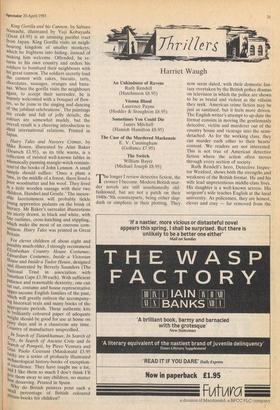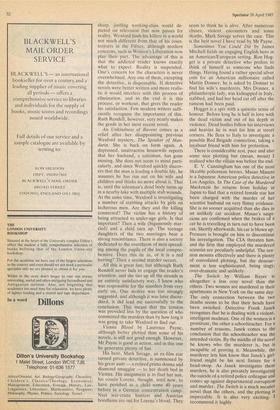Harriet Waugh
An Unkindness of Ravens Ruth Rendell (Hutchinson £8.95) Sometimes You Could Die James Mitchell (Hamish Hamilton £8.95) The Case of the Murdered Mackenzie E. V. Cunningham (Gollancz £7.95) The Switch William Bayer (Michael Joseph £8.95)
The longer I review detective fiction, the crosser I become. Modern British mur- der novels are still unashamedly old- fashioned, but are not a patch on their 1940s-'50s counterparts, being either slap- dash or simplistic in their plotting. They.
now seem dated, with their domestic fan- tasy overtaken by the British police dramas on television in which the police are shown to be as brutal and violent as the villains they seek. American crime fiction may be just as sanitised, but it feels more driven. The English writer's attempt to up-date the format consists in moving the gentlemanly detective, victim and murderer out of the country house and vicarage into the semi- detached. As for the working class, they can murder each other to their hearts' content. We readers are not interested. This is not true of American detective fiction where the action often moves through every section of society.
Ruth Rendell's hero, Detective Inspec- tor Wexford, shows both the strengths and weakness of the British format. He and his wife lead unpretentious middle-class lives. His daughter is a well-known actress. His sergeant's wife teaches English at the local university. As policemen, they are honest, clever and cosy — far removed from the
sharp, jostling working-class world de- picted on television that now passes for reality. Wexford finds his killers in a world not much different from that of his coun- terparts in the Fifties, although modern concerns, such as Women's Liberation now play their part. The advantage of this is that the addicted reader knows exactly what to expect. Reality is suspended. One's concern for the characters is never overwhelmed. Any one of them, excepting the detective, is dispensable. If detective novels were better written and more realis- tic it would, interfere with this process of elimination, and in the end it is this process, or workout, that gives the reader his satisfaction. Few modern writers suffi- ciently recognise the importance of this. Ruth Rendell, however, very nearly makes the grade in her most recent novel.
An Unkindness of Ravens comes as a relief after her disappointing previous Wexford mystery, The Speaker of Man- darin. She is, back on form again. A depressed, unattractive housewife reports that her husband, a salesman, has gone missing. She does not seem to mind parti- cularly, and since Wexford quickly discov- ers that the man is leading a double life, he assumes he has run out on his wife and children and thinks no more about it. That is, until the salesman's dead body turns up in a nearby lake with multiple stab wounds. At the same time, Wexford is investigating a number of stabbing attacks by girls on lecherous men. Are they and the killing connected? The victim has a history of being attracted to under-age girls. Is that important? Then a wife (bigamously mar- ried) and a child turn up. The teenage daughters of the two marriages bear a strong resemblance. There is also a society dedicated to the overthrow of men spread- ing among the pupils of the local compre- hensive. Does this tie in, or it is a red herring? Then a second murder occurs. '
All this is great fun; but although Ruth Rendell never fails to engage the reader's attention, and she ties up all the strands in an entirely satisfactory way, I knew who was responsible for the murders from very early on. One motive was too strongly suggested, and although it was later discre- dited, it did lead me successfully to the conclusion. This meant that the tension was provided less by the question of who committed the murders than by how long it was going to take Wexford to find out.
Vienna Blood by Laurence Payne, although better plotted than some of his novels, is still not good enough. However, Mr Payne is good at action, and in this one he generates plenty of fun.
His hero, Mark Savage, an ex-film star turned private detective, is summoned by his great aunt — a retired prima donna and diamond smuggler — to her death bed in Vienna. His assignment is to find her son, his cousin 'Lorenz, thought, until now, to have perished as a child some 40 years before in a German concentration camp.
Nazi war-crime hunters and Austrian hoodlums are out for Lorenz's blood. They seem to think he is alive. After numerous chases, violent encounters and some deaths, Mark Savage solves the case. This is the best novel I have read by Mr Payne.
Sometimes You Could Die by James Mitchell fields an engaging English hero in an American/European setting. Ron Hog- get is a private detective who prefers to think of himself as someone who finds things. Having found a rather special silver coin for an American millionaire called Martin Donner, he is asked by Donner to find his wife's murderers. Mrs Donner, a philanthropic lady, was kidnapped in Italy. stabbed, and had her head cut off after the ransom had been paid.
Hogget is a spiv with a quixotic sense of honour. Before long he is half in love with the dead victim and out of his depth in violence. Dead bodies follow his interviews and heavies lie in wait for him at street corners. He flees to Italy to investigate a possible Red Brigade connection, taking a layabout friend with him for protection. There is considerable zest, pace and also some nice plotting but (moan, moan) I realised who the villain was before the end. E. V. Cunningham has one of the most likeable policeman heroes. Masao Masuto is a Japanese American police detective in Los Angeles. In The Case of the Murdered Mackenzie he returns from holiday in Japan to find that a retired female star has been charged with the murder of her scientist husband on very flimsy evidence. She is no sooner acquitted than she dies in an unlikely car accident. Masao's suspi- cions are confirmed when the brakes of a car he is travelling in turn out to have been cut. Shortly afterwards, his car is blown up. Pressure is brought on him to discontinue his investigation. The CIA threaten him, and the firm that employed the murdered scientist are peculiarly unhelpful. The ten- sion mounts effectively and there is plenty of convoluted plotting, but the denoue- ment is less sophisticated, being stagy, over-dramatic and unlikely.
The Switch by William Bayer is altogether a less cosy novel than the others. Two women are murdered in their apartments in New York on the same day. The only connection between the two deaths seems to be that their heads have been switched. Detective Frank Janek recognises that he is dealing with a violent, intelligent madman. One of the women is a
prostitute, the other a schoolteacher. For a number of reasons, Janek comes to the
conclusion that the schoolteacher was the intended victim. By the middle of the novel he knows who the murderer is, but is incapable of proving it. Meanwhile, the murderer lets him know that Janek's
girl- friend might be his next fixture for a head-swop. As Janek investigates these murders, he is also privately investigating the suicide of a retired police colleague and comes up against departmental corruption and murder. The Switch is a much meatier novel than the others, and the plotting is impeccable. It is also very exciting. I recommend it highly.















































 Previous page
Previous page